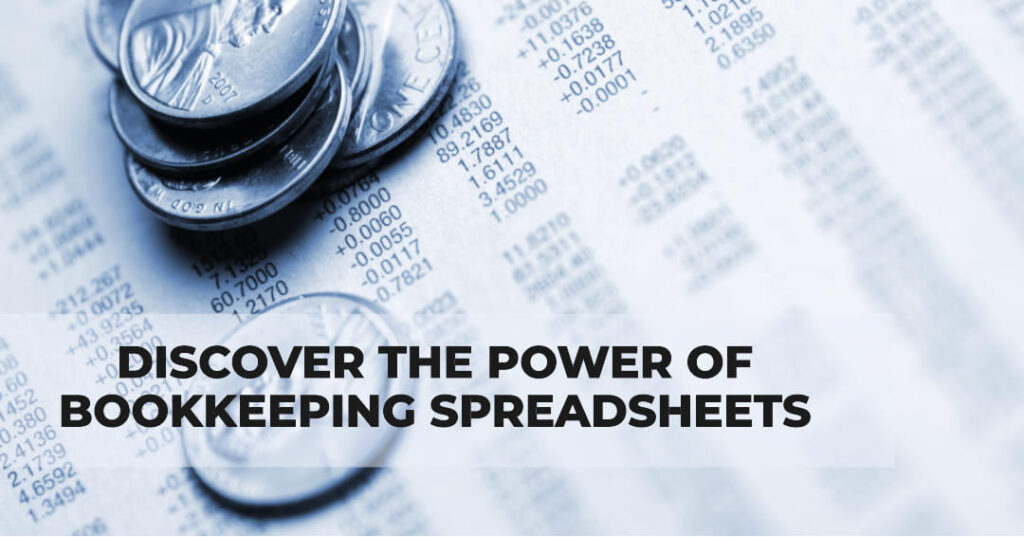Introduction
Effective financial management is crucial for the success of any business. One powerful tool that can significantly simplify this process is a bookkeeping spreadsheet. By utilizing a well-designed spreadsheet, businesses can efficiently track and organize their financial transactions, gain valuable insights, and make informed decisions. In this article, we will explore the benefits of using a bookkeeping spreadsheet and provide useful tips to create and optimize one for your business.
 Organization and Accessibility
Organization and Accessibility
A bookkeeping spreadsheet brings order to your financial data. With separate sheets or tabs dedicated to income, expenses, assets, liabilities, and equity, you can neatly organize and categorize your financial information. This structure allows for easy accessibility, ensuring that you can quickly locate specific transactions or analyze data at a glance.
Customization for Your Business
One of the key advantages of a bookkeeping spreadsheet is its ability to be tailored to the unique needs of your business. You can customize column headers, create specific categories, and define formulas that suit your financial requirements. This flexibility enables you to adapt the spreadsheet to reflect the specific nature of your industry and the intricacies of your business operations.
Efficient Recording of Transactions with a Bookkeeping Spreadsheet
With a bookkeeping spreadsheet, recording financial transactions becomes a breeze. Each transaction can be entered into the appropriate sheet with relevant details such as the date, customer/vendor name, invoice number, payment method, and amount. You can automate calculations and totals using built-in formulas, eliminating the need for manual calculations and reducing the risk of errors.
Powerful Data Analysis
The ability to analyze your financial data is a crucial aspect of effective bookkeeping. A spreadsheet allows you to generate reports and gain valuable insights into your business’s financial health. By utilizing functions like SUM, AVERAGE, and COUNT, you can calculate totals, averages, and other metrics with ease. You can also create charts and graphs to visualize trends and patterns, helping you identify areas for improvement and make data-driven decisions.
Streamlined Reporting
A bookkeeping spreadsheet simplifies the process of generating financial statements. You can consolidate data from various sheets to create income statements, balance sheets, and cash flow statements. By linking relevant cells and utilizing formulas, your spreadsheet can automatically update these reports as you input new transactions, saving you time and ensuring accuracy.
 Enhanced Financial Control:
Enhanced Financial Control:
Maintaining financial control is essential for any business. A bookkeeping spreadsheet enables you to implement internal controls and monitor your finances effectively. By regularly reviewing and reconciling your spreadsheet with bank statements, you can identify discrepancies, detect errors, and prevent potential fraud. You can also set up alerts and reminders for payment due dates, ensuring timely payments and avoiding penalties.
Scalability and Expansion:
A bookkeeping spreadsheet is highly scalable and can accommodate the growth of your business. As your operations expand, you can add additional sheets or tabs to track specific aspects such as inventory, projects, or multiple business entities. Furthermore, you can leverage advanced features like macros or automation to streamline repetitive tasks and further optimize your bookkeeping process.
Conclusion:
In today’s digital age, a bookkeeping spreadsheet is an invaluable tool for businesses of all sizes. It offers organization, customization, and efficiency in managing financial transactions, enabling you to gain insights, generate reports, and maintain financial control. By investing time in creating and optimizing a bookkeeping spreadsheet tailored to your business needs, you can streamline your finances, make informed decisions, and pave the way for long-term financial success.
Please note that while a bookkeeping spreadsheet is a valuable resource, it is crucial to have a foundational understanding of bookkeeping principles and consult with a professional accountant to ensure compliance with accounting standards and best practices.



